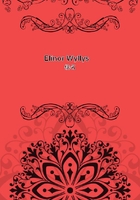
第208章
As for Hopgood, we have already mentioned that he had been arrested, and most righteously condemned to a long imprisonment for his share in that unprincipled, audacious conspiracy. A year afterwards, however, it pleased those in authority to send him out into the community again; he was pardoned--As all reserve is generally dropped in the last chapter, we may as well tell the reader a secret of Mrs. Creighton's. We have every reason to believe that she never cared much for Harry, although she always cared a great deal for his fortune. She was determined to marry again, for two reasons; in the first place she did not wish to give way to a sister-in-law, and she knew her brother intended marrying; and then she never could manage that brother as she wished; he was by no means disposed to throw away as much time, thought, and money upon dissipation, as she would have liked. She wanted a rich husband, of course; Harry did very well in every particular but one--she thought him too much like her brother in his tastes to be all she desired; still he suited her better than any of her other admirers, and she would have been quite satisfied to accept him, had he kept his fortune.
Without that fortune, it was a very different affair; he was no longer to be thought of for a moment. We strongly suspect also, that the pretty widow saw farther than any one else into the true state of matters between Elinor and Harry, long before the parties themselves had had an explanation; and for that reason, so long as she was determined to take Hazlehurst for her second husband, she decidedly encouraged Ellsworth's attention to Elinor. Since we are so near the last page, we shall also admit that Mrs. Creighton had quite a strong partiality for Mr. Stryker, while the gentleman was thoroughly in love with her; but neither was rich, and money, that is to say wealth, was absolutely necessary in the opinion of both parties; so Mr. Stryker went off to New Orleans in quest of a quadroon heiress recommended to him, and Mrs. Creighton became Mrs. Pompey Taylor, junior; marrying the second son of the merchant, an individual who was nearly ten years younger than herself, and resembled his brother in every respect except in being much less handsome. The happy couple sailed for Europe immediately after the ceremony.
We are sorry to say that Mr. Taylor, the father, suffered severely, not long after the marriage of his second son, by the great fire; he suffered also in the great panic, and in various other panics which have succeeded one another. Still he has not failed, but he is a poorer man than when we first had the honour of making his acquaintance. In other respects he is much what he was fifteen years ago, devoted as much as ever and as exclusively as ever to making money; still valuing everything, visible or invisible, by the market-price in gold, silver, or bank-notes; although unfortunately much less successful than at the commencement of his career, in accumulating dollars and cents; his seems to be "the fruitless race, without a prize;" and yet Mr. Taylor is approaching the time of life when the end of the race cannot be very distant.
{"the great fire" = the fire that destroyed much of downtown New York City in 1835. "the great panic..." = the financial panic of 1837, and the depression that followed; "the fruitless race..." = from William Cowper (English poet, 1731-1800), "Hope" line 25}
Adeline is improved in many respects, her mother's advice has had a good effect on her; still it is amusing to see her already training up several little girls for future belles, on her own pattern; rather it is believed to the annoyance of her quiet husband. Emma Taylor is decidedly less lively, she too having in some measure composed herself, after achieving belle-ship and matrimony.
Mr. and Mrs. Uncle Dozie removed from Longbridge not long after their marriage; they have since returned there again, and now, by the last accounts, they are again talking of leaving the place.